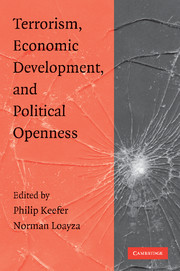Book contents
- Frontmatter
- Contents
- List of Tables
- List of Figures
- Contributors
- Overview: Terrorism, Economic Development, and Political Openness
- PART ONE THE COSTS OF TERRORISM
- PART TWO DEVELOPMENT, DEMOCRACY, AND THE ORIGINS OF TERRORISM
- 3 From (No) Butter to Guns? Understanding the Economic Role in Transnational Terrorism
- 4 The Lexus and the Olive Branch: Globalization, Democratization, and Terrorism
- 5 Kto Kogo?: A Cross-Country Study of the Origins and Targets of Terrorism
- 6 Terrorism and Civil War
- PART THREE THE ORIGINS OF TERRORISTS
- Appendix
- Index
- References
5 - Kto Kogo?: A Cross-Country Study of the Origins and Targets of Terrorism
Published online by Cambridge University Press: 06 July 2010
- Frontmatter
- Contents
- List of Tables
- List of Figures
- Contributors
- Overview: Terrorism, Economic Development, and Political Openness
- PART ONE THE COSTS OF TERRORISM
- PART TWO DEVELOPMENT, DEMOCRACY, AND THE ORIGINS OF TERRORISM
- 3 From (No) Butter to Guns? Understanding the Economic Role in Transnational Terrorism
- 4 The Lexus and the Olive Branch: Globalization, Democratization, and Terrorism
- 5 Kto Kogo?: A Cross-Country Study of the Origins and Targets of Terrorism
- 6 Terrorism and Civil War
- PART THREE THE ORIGINS OF TERRORISTS
- Appendix
- Index
- References
Summary
Introduction
Popular wisdom in the burgeoning literature on terrorism focuses on the economic motivations of terrorists. “We fight against poverty,” President George W. Bush explained in Monterrey, Mexico, on March 23, 2002, “because hope is an answer to terror.” Stern (2003) also draws a direct connection between poverty and terrorism. Though poverty is an attractive answer to the question of “why terrorism?”, the data do not lend much support for it. Macroeconomic shifts generally fail to map on to changes in terrorist activity. For example, in the late 1990s and 2000, when terrorism reached new heights against Israeli citizens, the typical Palestinian was reporting a rosier economic forecast and unemployment was declining. Using a longer time series, Berrebi (2003) finds little correlation between economic conditions in the West Bank and Gaza Strip and the number of terrorist incidents against Israel. An even more perplexing problem for the poverty thesis arises on the microlevel. Several studies at the individual level of analysis have failed to find any direct connection between education, poverty, and the propensity to participate in terrorism (Russell and Miller 1983; Taylor 1988; Hudson 1999; Krueger and Maleckova 2003; Berrebi 2003; Atran 2003). If anything, those who participate in terrorism tend to come from the ranks of the better off in society.
Those who claim a connection between poverty and terrorism could respond that at least on the microlevel, well-to-do citizens become terrorists out of public spiritedness for their impoverished fellow citizens, and organizations choose them to perform these tasks because of their reliability and skill.
- Type
- Chapter
- Information
- Terrorism, Economic Development, and Political Openness , pp. 148 - 173Publisher: Cambridge University PressPrint publication year: 2008
References
- 135
- Cited by



